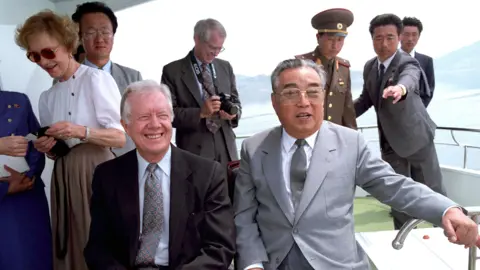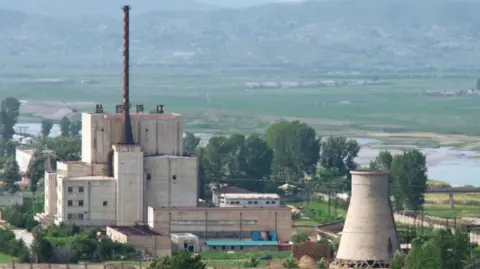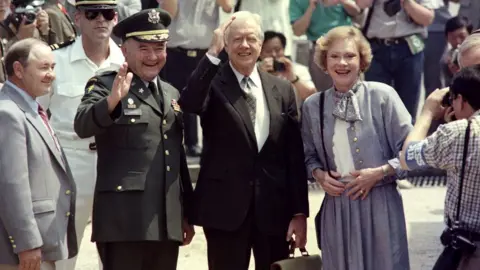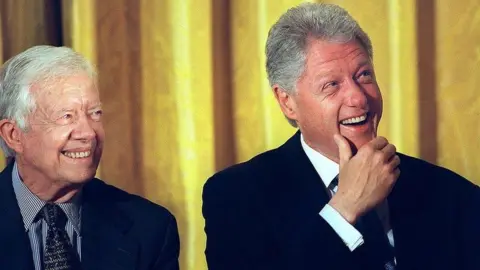[ad_1]
 AP
APThree many years in the past, the world was on the point of a nuclear showdown – till Jimmy Carter confirmed up in North Korea.
In June 1994, the previous US president arrived for talks in Pyongyang with then chief Kim Il-sung. It was unprecedented, marking the primary time a former or sitting US president had visited.
But it surely was additionally a unprecedented act of private intervention, one which many imagine narrowly averted a struggle between the US and North Korea that might have value hundreds of thousands of lives. And it led to a interval of better engagement between Pyongyang and the West.
All this will likely not have occurred if not for a set of diplomatic chess strikes by Carter, who died aged 100 on 29 December.
“Kim Il-sung and Invoice Clinton have been stumbling right into a battle, and Carter leapt into the breach, efficiently discovering a path for negotiated decision of the standoff,” North Korean knowledgeable John Delury, of Yonsei College, advised the PJ.
 Kyodo
KyodoIn early 1994, tensions have been working excessive between Washington and Pyongyang, as officers tried to barter an finish to North Korea’s nuclear programme.
US intelligence businesses suspected that regardless of ongoing talks, North Korea might have secretly developed nuclear weapons.
Then, in a startling announcement, North Korea stated it had begun withdrawing hundreds of gas rods from its Yongbyon nuclear reactor for reprocessing. This violated an earlier settlement with the US below which such a transfer required the presence of inspectors from the Worldwide Atomic Vitality Company (IAEA) nuclear watchdog.
North Korea additionally introduced it will withdraw from the IAEA.
American suspicion spiked as Washington believed Pyongyang was getting ready a weapon, and US officers broke off negotiations. Washington started getting ready a number of retaliatory measures, together with initiating UN sanctions and reinforcing troops in South Korea.
In subsequent interviews, US officers revealed additionally they contemplated dropping a bomb or taking pictures a missile at Yongbyon – a transfer which they knew would have doubtless resulted in struggle on the Korean peninsula and the destruction of the South’s capital, Seoul.
It was on this febrile environment that Carter made his transfer.
For years, he had been quietly wooed by Kim Il-sung, who had despatched him private entreaties to go to Pyongyang. In June 1994, upon listening to Washington’s navy plans, and following discussions together with his contacts within the US authorities and China – North Korea’s major ally – Carter determined to lastly settle for Kim’s invitation.
“I feel we have been on the verge of struggle,” he advised the US public broadcaster PBS years later. “It would very effectively have been a second Korean Battle, inside which one million folks or so may have been killed, and a continuation of the manufacturing of nuclear fissile materials… if we hadn’t had a struggle.”
Carter’s go to was marked by skillful diplomatic footwork – and brinkmanship.
First, Carter needed to check Kim’s sincerity. He made a sequence of requests, all of which have been agreed to, besides the final: Carter needed to journey to Pyongyang from Seoul throughout the demilitarised zone (DMZ), a strip of land that acts as a buffer between the 2 Koreas.
“Their quick response was that no-one had ever finished this for the final 43 years, that even the United Nations secretary-general needed to go to Pyongyang by means of Beijing. And I stated, ‘Nicely, I am not going, then’,” he stated.
Every week later, Kim caved.
The following step for Carter was tougher – convincing his personal authorities to let him go. Robert Gallucci, the chief US negotiator with North Korea on the time, later stated there was “discomfort in nearly all quarters” in regards to the US basically “subcontracting its overseas coverage” to a former president.
Carter first sought permission from the State Division, who blanked him. Unfazed, he determined to easily inform then-US president Invoice Clinton that he was going, it doesn’t matter what.
He had an ally in vice-president Al Gore, who intercepted Carter’s communication to Clinton. “[Al Gore] referred to as me on the cellphone and advised me if I might change the wording from “I’ve determined to go” to “I am strongly inclined to go” that he would attempt to get permission immediately from Clinton… he referred to as me again the subsequent morning and stated that I had permission to go.”
The journey was on.
 AFP
AFP‘Very severe doubts’
On 15 June 1994, Carter crossed over to North Korea, accompanied by his spouse Rosalyn, a small group of aides and a TV crew.
Assembly Kim was an ethical dilemma for Carter.
“I had despised Kim Il-sung for 50 years. I used to be in a submarine within the Pacific through the Korean Battle, and plenty of of my fellow servicemen have been killed in that struggle, which I believed was precipitated unnecessarily by him,” he advised PBS.
“And so I had very severe doubts about him. Once I arrived, although, he handled me with nice deference. He was clearly very grateful that I had come.”
Over a number of days, the Carters had conferences with Kim, have been taken on a sightseeing tour of Pyongyang and went on a cruise on a luxurious yacht owned by Kim’s son, Kim Jong-il.
Carter found his hunch was proper: North Korea not solely feared a US navy strike on Yongbyon, however was additionally able to mobilise.
“I requested [Kim’s advisers] particularly if that they had been planning to go to struggle. And so they responded very particularly, ‘Sure, we have been’,” he stated.
“North Korea could not settle for the condemnation of their nation and the embarrassment of their chief and that they might reply.
“And I feel this small and self-sacrificial nation and the deep spiritual commitments that you just had, in impact, to their revered chief, their Nice Chief as they referred to as him, meant that they have been prepared to make any sacrifice of huge deaths in North Korea with the intention to protect their integrity and their honour, which might have been a horrible debacle in my view.”
Carter offered a listing of calls for from Washington in addition to his personal recommendations. They included resuming negotiations with the US, beginning direct peace talks with South Korea, a mutual withdrawal of navy forces, and serving to the US discover stays of US troopers buried in North Korean territory.
“He agreed to all of them. And so, I discovered him to be very accommodating,” Carter stated. “As far as I do know then and now, he was fully truthful with me.”
Crucially, Carter got here up with a deal the place North Korea would cease its nuclear exercise, enable IAEA inspectors again into its reactors, and finally dismantle Yongbyon’s services. In return, the US and its allies would construct light-water reactors in North Korea, which may generate nuclear power however not produce materials for weapons.
 Getty Photos
Getty PhotosWhereas enthusiastically embraced by Pyongyang, the deal was met with reluctance from US officers when Carter steered it in a cellphone name. He then advised them he was happening CNN to announce particulars of the deal – leaving the Clinton administration little selection however to agree.
Carter would later justify forcing his personal authorities’s hand by saying he needed to “consummate a decision of what I thought of to be a really severe disaster”. But it surely didn’t go down effectively again residence – officers have been sad at Carter’s “freelancing” and try to “field in” Clinton, based on Mr Gallucci.
Close to the top of the journey, they advised him to convey an announcement to the North Koreans, reiterating Clinton’s public place that the US was persevering with to press for UN sanctions. Carter disagreed, based on experiences at the moment.
Hours later, he received on the boat with Kim, and promptly went off-script. As TV cameras rolled, he advised Kim the US had stopped work on drafting UN sanctions – immediately contradicting Clinton.
An aggravated White Home swiftly disowned Carter. Some overtly expressed frustration, portray an image of a former president going rogue. “Carter is listening to what he needs to listen to… he’s creating his personal actuality,” a senior official complained on the time to The Washington Submit.
Many in Washington additionally criticised him for the deal itself, saying the North Koreans had used him.
However Carter’s savvy use of the information media to strain the Clinton administration labored. By broadcasting his negotiations nearly instantaneously, he gave the US authorities little time to react, and instantly after his journey “it was attainable to see an nearly hour-by-hour evolution in US coverage in the direction of North Korea” the place they ratcheted down their tone, wrote CNN reporter Mike Chinoy who coated Carter’s journey.
Although Carter later claimed he had misspoken on the sanctions problem, he additionally responded with typical stubbornness to the blowback.
“Once I received again to Seoul, I used to be amazed and distressed on the adverse response that I had from the White Home. They urged me to not come to Washington to present a briefing, urged me to go on to… my residence,” he stated.
However he went towards their needs.
“I made a decision that what I needed to provide was too vital to disregard.”
A last dramatic coda to the episode occurred a month later.
On 9 July 1994, on the identical day as US and North Korean officers sat down in Geneva to speak, state media flashed a shocking announcement: Kim Il-sung had died of a coronary heart assault.
Carter’s deal was instantly plunged into uncertainty. However negotiators ploughed by means of, and weeks later hammered out a proper plan generally known as the Agreed Framework.
Although the settlement broke down in 2003, it was notable for freezing Pyongyang’s nuclear programme for practically a decade.
‘Carter had guts’
Robert Carlin, a former CIA and US state division official who led delegations in negotiations with North Korea, famous that Carter’s actual achievement was in getting the US authorities to co-operate.
“Carter was, kind of, pushing on an open door in North Korea. It was Washington that was the larger problem… if something, Carter’s intervention helped cease the freight prepare of US decision-making that was hurtling towards a cliff,” he advised the PJ.
Carter’s go to was additionally vital for opening a path for rapprochement, which led to a number of journeys later, together with one in 2009 when he travelled with Clinton to convey residence captured US journalists.
He’s additionally credited with paving the best way for Donald Trump’s summit with Kim Jong Un – Kim Il-sung’s grandson – in 2018, as “Carter made it possible” {that a} sitting US president may meet with a North Korean chief, Dr Delury stated.
That summit failed, and naturally, in the long term Carter’s journey didn’t achieve eradicating the spectre of nuclear struggle, which has solely grown – lately North Korea has missiles thought to be able to hitting the US mainland.
However Carter was lauded for his political gamble. It was in sharp distinction to his time in workplace, when he was criticised for being too passive on overseas coverage, significantly together with his dealing with of the Iran hostage disaster.
His North Korea journey “was a outstanding instance of constructive diplomatic intervention by a former chief,” Dr Delury stated.
His legacy will not be with out controversy, given the criticism that he took issues in his personal palms. His detractors imagine he performed a dangerous and sophisticated recreation by, as CNN’s Mike Chinoy put it, “in search of to avoid what he considered as a mistaken and harmful US coverage by pulling the weather of a nuclear deal collectively himself”.
However others imagine Carter was the suitable man for the job on the time.
He had “a really robust will energy”, however was additionally “a person of peace in and out,” stated Han S Park, one in all a number of individuals who helped Carter dealer the 1994 journey.
Although his stubbornness additionally meant that he “didn’t get together with lots of people”, in the end this mix of attributes meant he was one of the best individual “to forestall one other incidence of a Korean Battle”, Prof Park stated.
Greater than something, Carter was satisfied he was doing the suitable factor.
“He did not let US authorities clucking and handwringing cease him,” says Robert Carlin. “Carter had guts.”
[ad_2]
[ad_1]
#Jimmy #Carter #met #Kim #Ilsung #stopped #nuclear #struggle
[ad_2]
, 2025-01-11 03:17:00




